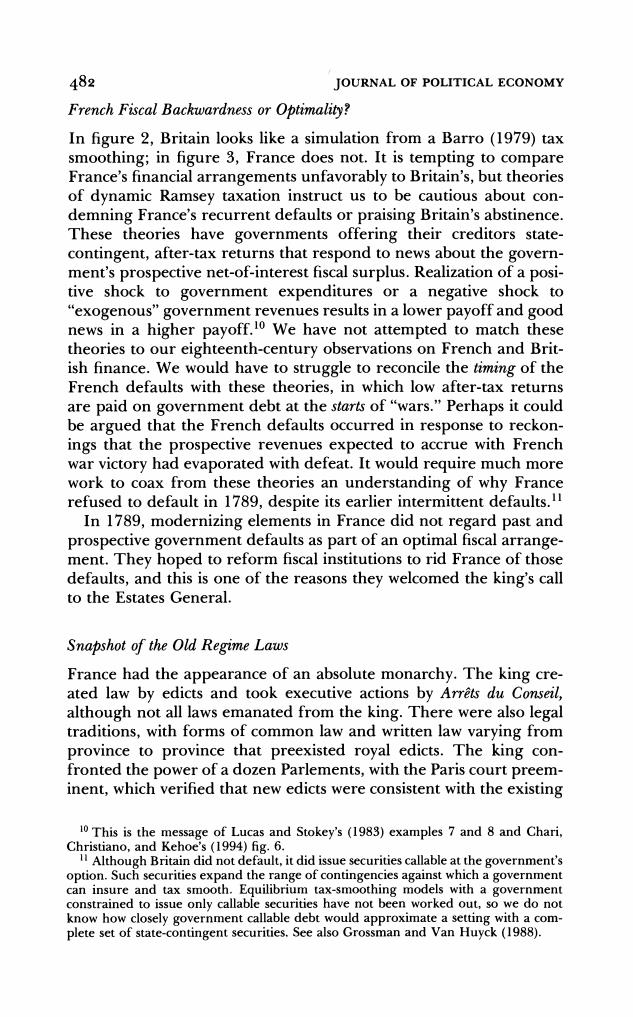正在加载图片...

482 JOURNAL OF POLITICAL ECONOMY French Fiscal Backwardness or Optimality? In figure 2,Britain looks like a simulation from a Barro (1979)tax smoothing;in figure 3,France does not.It is tempting to compare France's financial arrangements unfavorably to Britain's,but theories of dynamic Ramsey taxation instruct us to be cautious about con- demning France's recurrent defaults or praising Britain's abstinence. These theories have governments offering their creditors state- contingent,after-tax returns that respond to news about the govern- ment's prospective net-of-interest fiscal surplus.Realization of a posi- tive shock to government expenditures or a negative shock to "exogenous"government revenues results in a lower payoff and good news in a higher payoff.10 We have not attempted to match these theories to our eighteenth-century observations on French and Brit- ish finance.We would have to struggle to reconcile the timing of the French defaults with these theories,in which low after-tax returns are paid on government debt at the starts of"wars."Perhaps it could be argued that the French defaults occurred in response to reckon- ings that the prospective revenues expected to accrue with French war victory had evaporated with defeat.It would require much more work to coax from these theories an understanding of why France refused to default in 1789,despite its earlier intermittent defaults. In 1789,modernizing elements in France did not regard past and prospective government defaults as part of an optimal fiscal arrange- ment.They hoped to reform fiscal institutions to rid France of those defaults,and this is one of the reasons they welcomed the king's call to the Estates General. Snapshot of the Old Regime Laws France had the appearance of an absolute monarchy.The king cre- ated law by edicts and took executive actions by Arrets du Conseil, although not all laws emanated from the king.There were also legal traditions,with forms of common law and written law varying from province to province that preexisted royal edicts.The king con- fronted the power of a dozen Parlements,with the Paris court preem- inent,which verified that new edicts were consistent with the existing 10 This is the message of Lucas and Stokey's(1983)examples 7 and 8 and Chari, Christiano,and Kehoe's(1994)fig.6. Although Britain did not default,it did issue securities callable at the government's option.Such securities expand the range of contingencies against which a government can insure and tax smooth.Equilibrium tax-smoothing models with a government constrained to issue only callable securities have not been worked out,so we do not know how closely government callable debt would approximate a setting with a com- plete set of state-contingent securities.See also Grossman and Van Huyck(1988).482 JOURNAL OF POLITICAL ECONOMY French Fiscal Backwardness or Optimality? In figure 2, Britain looks like a simulation from a Barro (1979) tax smoothing; in figure 3, France does not. It is tempting to compare France's financial arrangements unfavorably to Britain's, but theories of dynamic Ramsey taxation instruct us to be cautious about condemning France's recurrent defaults or praising Britain's abstinence. These theories have governments offering their creditors statecontingent, after-tax returns that respond to news about the government's prospective net-of-interest fiscal surplus. Realization of a positive shock to government expenditures or a negative shock to ''exogenous" government revenues results in a lower payoff and good news in a higher payoff.10 We have not attempted to match these theories to our eighteenth-century observations on French and British finance. We would have to struggle to reconcile the timing of the French defaults with these theories, in which low after-tax returns are paid on government debt at the starts of "wars." Perhaps it could be argued that the French defaults occurred in response to reckonings that the prospective revenues expected to accrue with French war victory had evaporated with defeat. It would require much more work to coax from these theories an understanding of why France refused to default in 1789, despite its earlier intermittent defaults." In 1789, modernizing elements in France did not regard past and prospective government defaults as part of an optimal fiscal arrangement. They hoped to reform fiscal institutions to rid France of those defaults, and this is one of the reasons they welcomed the king's call to the Estates General. Snapshot of the Old Regime Laws France had the appearance of an absolute monarchy. The king created law by edicts and took executive actions by Arrnts du Conseil, although not all laws emanated from the king. There were also legal traditions, with forms of common law and written law varying from province to province that preexisted royal edicts. The king confronted the power of a dozen Parlements, with the Paris court preeminent, which verified that new edicts were consistent with the existing '0 This is the message of Lucas and Stokey's (1983) examples 7 and 8 and Chari, Christiano, and Kehoe's (1994) fig. 6. '" Although Britain did not default, it did issue securities callable at the government's option. Such securities expand the range of contingencies against which a government can insure and tax smooth. Equilibrium tax-smoothing models with a government constrained to issue only callable securities have not been worked out, so we do not know how closely government callable debt would approximate a setting with a complete set of state-contingent securities. See also Grossman and Van Huyck (1988)